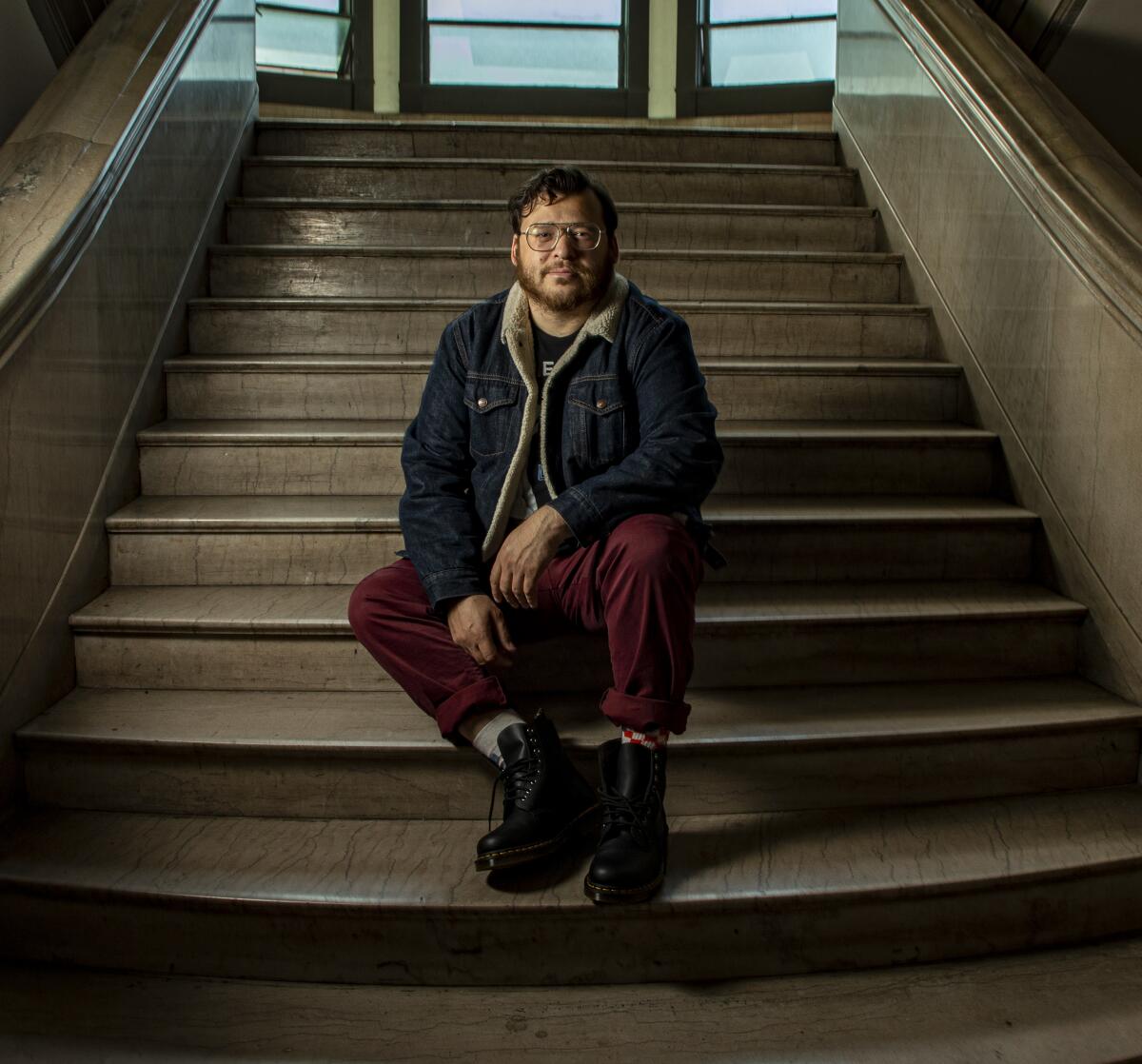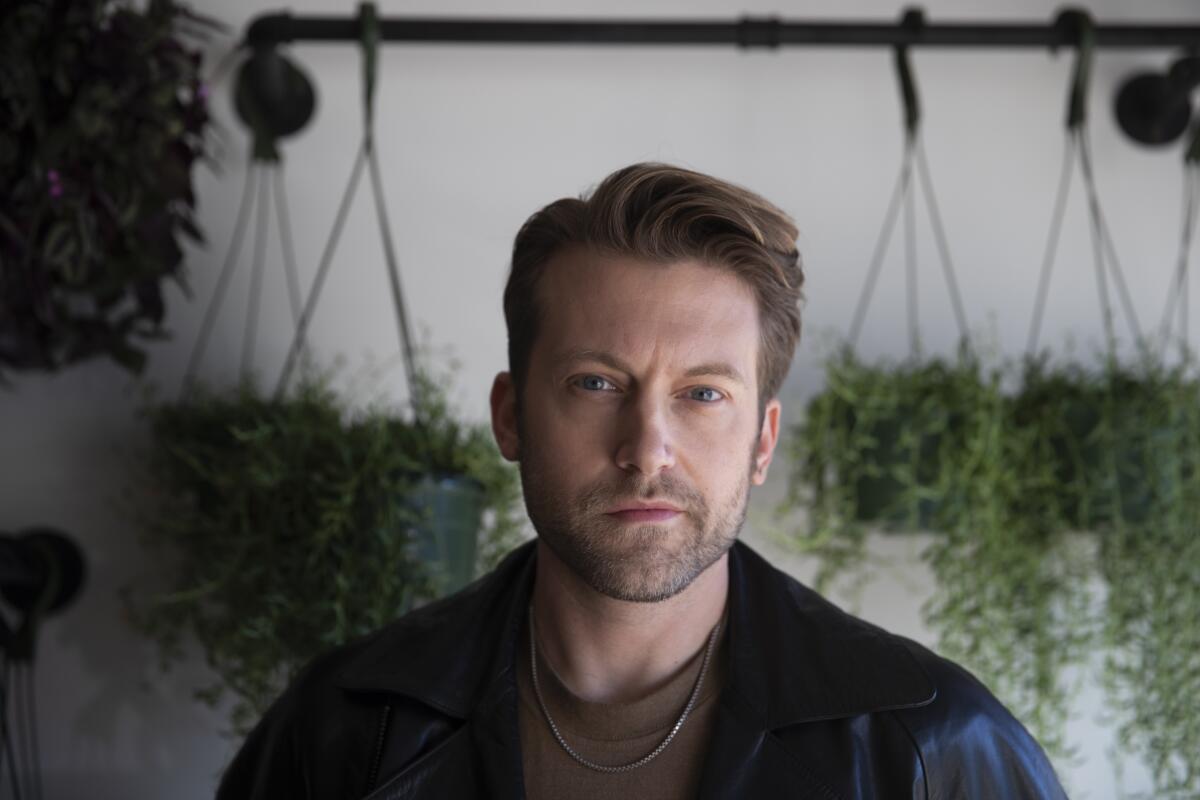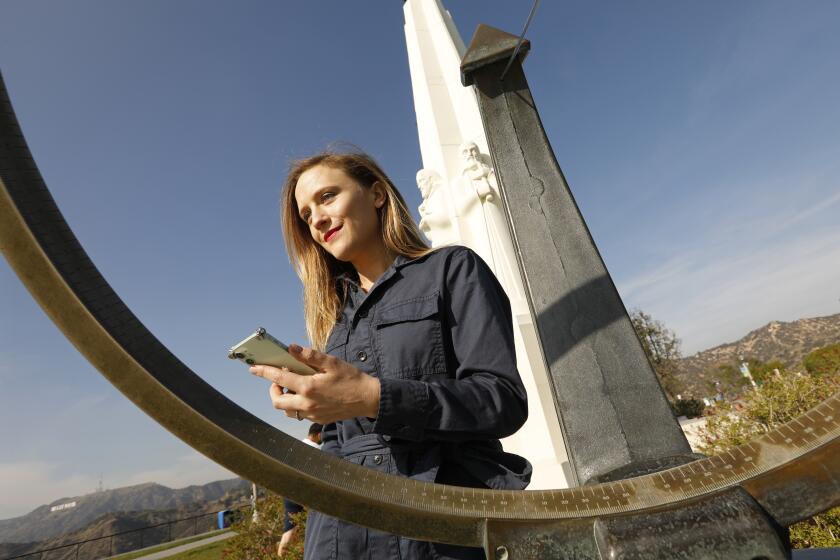Opera gets a TV makeover: How ‘Desert In’ blew up an old art form for the ‘Insecure’ generation

- Share via
When playwright christopher oscar peña first moved to New York, he wanted to immerse himself in the city’s cultural offerings, so he splurged on subscription tickets to the Metropolitan Opera.
He attended an entire season of opera but struggled to connect with the art form. The 36-year-old San Jose native said most of those performances left him so uninspired he skipped out at intermission.
“I’ve struggled with opera,” peña said. “I think it’s generational. We’re on Twitter. We’re watching half-hour narratives on TV. Our brains just work faster. And I think opera is a very, very, very slow art form. You really do sit there for half an hour and only hear three lines of plot.”
The writer, who uses all lowercase letters to spell his name as a way of “owning language in a different way,” didn’t find the opera he was looking for onstage at the Met. If it exists, he hasn’t come across it.
Until now, that is, because he and his friends have created it.
“Desert In” is an operatic experiment. Co-produced by Long Beach Opera and by Boston Lyric Opera, which commissioned the work, the eight-episode streaming miniseries is the brainchild of LBO Artistic Director and Chief Creative Officer James Darrah, composer Ellen Reid and peña, who has had success as a playwright and as a TV writer (“Insecure,” “Motherland: Fort Salem”).
The first two episodes of “Desert In” premiered June 3. The remainder have been rolling out two per week on Boston Lyric Opera’s streaming service, operabox.tv.
“Desert In” has the sex appeal and narrative finesse of prestige TV and the aesthetic of an art film. A reflection of its diverse creative team, the show is unapologetically queer and elevates the stories of people of color. Episodes are just 15 to 20 minutes long, but each packs a hefty dramatic and artistic punch — operatic excess reduced to an intensely rich sauce, served in small portions designed to leave audiences craving more.
The core creative team brought in a diverse group of composers, playwrights, TV writers, actors and opera stars for episodes that attempt to achieve what good opera always has: interdisciplinary maximalism.
Historically, that has meant a combination of theater, music and sometimes dance. “Desert In” seeks to update the formula. It asks, why not film, television and cabaret also? Why not include everyone?
In some ways, “Desert In” was born of pandemic necessity. With opera houses closed indefinitely last year because of COVID-19, Boston Lyric Opera commissioned filmed material that could be streamed.
But the series is also a result of years of conversations between Reid and Darrah, both of whom are passionate about pushing opera toward a more modern, inclusive and vibrant future dominated by new music instead of old. The most notable collaboration between the composer and the director was the 2018 opera “prism,” which won Reid a Pulitzer and nudged the genre forward through female-centric storytelling and inventive artistry.

Reid and Darrah were days from the Kennedy Center premiere of “prism” in March 2020 when the pandemic closures hit. Both fielded an avalanche of heartbreaking cancellations for their respective projects that week. But they stayed in communication, and Darrah said he and Reid agreed that the pandemic was “a time for response, action and leadership, not waiting and despair.” It was time to make some bold, weird, beautiful opera TV.
Reid said peña was the perfect choice to lead the writing side of the project because of his extensive experience with both TV and theater, and because he had no background in opera. When you’re trying to reinvent an art form, she said, it’s useful to include an outsider’s point of view.
She and Darrah “are interested in blurring boundaries around art in general. We thought that if we wanted to expand what opera could be, it made sense to bring in people who could see it clearly from other angles,” she said.
Darrah and peña have known each other for more than a decade. Although peña didn’t know Reid personally, he had attended the world premiere of “prism” in 2018 in support of Darrah and the opera’s librettist, playwright Roxie Perkins, with whom he’d attended a Sundance writers retreat.
Peña said he got a call from Darrah right after the pandemic hit: “James said, ‘I want to do this thing with Ellen Reid, are you in?’ And I said yes without even thinking about it.”
For “Desert In,” Darrah produced, directed and convened onscreen talent that includes Tony Award-nominated actor and cabaret singer Mx. Justin Vivian Bond, Grammy Award-winning mezzo-soprano Isabel Leonard and actor Raviv Ullman of Disney’s “Phil of the Future“ and “The Accidental Wolf.” He also assembled an off-screen team that includes director of photography Michael Elias Thomas, production designer Yuki Izumihara, costume designer Molly Irelan and lighting designer Pablo Santiago.
Reid summoned the composers, one per episode. Her goal was an artistically diverse group that would give each installment a strikingly unique musical palette. The group includes jazz composer-pianist and MacArthur fellow Vijay Iyer; Haitian American flutist, composer and vocalist Nathalie Joachim; and film composer Michael Abels, who scored “Get Out” and “Us.” Reid composed the pilot episode.
Peña acted as showrunner and assembled the writers room, filling it with a mix of TV and theater writers such as Kirsten Greenidge (“Beacon,” “Bud Not Buddy”), playwright and performer Ryan J. Haddad (“The Politician,” “Unbreakable Kimmy Schmidt”) and “prism” librettist and playwright Perkins, the only writer on the team with experience in opera.
For help running the writers room, peña phoned a friend. He had met veteran TV writer Joy Kecken working on the Freeform show “Motherland: Fort Salem,” and he knew her expertise would be invaluable in bringing this project together.
'Desert In'
Who: Co-produced by Long Beach Opera and Boston Lyric Opera
Where: Streaming through the Boston Lyric Opera’s platform, operabox.tv
Tickets: $5 per episode, $30 for eight-episode pass, $99 for an annual digital subscription
Running time: Episodes are 17 to 25 minutes
Kecken began her career writing for “Homicide: Life on the Street,” and she had written and directed for HBO’s “The Wire” and been a supervising producer on Marvel’s “Cloak and Dagger.” At first, she was hesitant about joining the “Desert In” team.
She told peña that she really didn’t know opera. “I was really intimated by it, actually,” Kecken said. She remembers regularly walking by the opera house in Baltimore when she lived there, seeing the mostly white, older audience spill out into the street after a show.
“I very much felt like this isn’t for me. I don’t know if they were trying to appeal to a nontraditional audience. I never got that sense. I knew [the opera] was a cornerstone of the community, but I just never felt like I could even go in there,” said Kecken, who is Black and bisexual.
To counter Kecken’s hesitations, peña told her that at its heart “Desert In” would be driven by compelling storytelling just like any great TV show. He pitched her the premise: a story about loss and longing centered on a mysterious and magical desert hotel for the heartbroken.
Once Kecken joined the team, she was all-in, writing one episode, directing another and serving as a consulting producer. Instead of feeling excluded by opera, she has become an enthusiastic advocate.
“I’m very, very proud of it. This is just one of those projects that gripped my heart and wouldn’t let go. I talk about it all the time, trying to get everyone to check it out. It filled all my creative hot spots. I think it will do the same for other people, and I hope they give it a chance,” she said.
James Darrah has emerged as a key figure in the year of COVID-19, leading digital productions for companies in L.A., Boston and beyond.
Kecken said that peña, the gay son of Honduran immigrants, assembled a writers room for “Desert In” that was probably the most diverse and inclusive of any she had worked. “The spectrum of LGBTQ+, Black and Latinx and Asian and disabled writers, we really shared a representation that I hadn’t experienced before,” Kecken said.
Nearly two decades ago, when Kecken was writing scenes for “The Wire” character Kima Greggs, portraying a gay Black woman onscreen was groundbreaking. Today, diverse characters are better represented on TV. That is not the case on opera stages, which have remained stubbornly white and homogeneous.
The hope is that instead of leaving halfway through a series that doesn’t resonate, “Desert In” viewers will gobble up episodes because they feel connected to the art. Instead of being asked to enter a performance space where they don’t feel welcome, they can absorb the art from home. And for opera in general, instead of more of the same, this time it’s something new.
‘Ellen Reid Soundwalk,’ the Pulitzer-winning composer’s music mapped to the trails of L.A.’s popular park, goes live on Thursday via a free app.
More to Read
The biggest entertainment stories
Get our big stories about Hollywood, film, television, music, arts, culture and more right in your inbox as soon as they publish.
You may occasionally receive promotional content from the Los Angeles Times.












